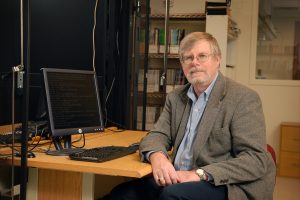
A researcher at The University of Alabama will access some of the world’s most powerful supercomputers to understand more about the properties of elements that power nuclear energy.
Dr. David A. Dixon, UA’s Robert Ramsay Professor of Chemistry, leads a team that will use a supercomputer at Oak Ridge National Laboratory as part of the United States Department of Energy INCITE program. His project is one of 47 awarded supercomputer time for 2020 as part of the program that aims to accelerate discovery and innovation through large time allocations.
Dixon’s team, which includes researchers at Washington State University and the University of Washington, will advance the basic science needed to develop new nuclear reactors with advanced fuel cycles to be safer than current technology while still meeting energy needs. The research by his team is sponsored by the Department of Energy’s Basic Energy Sciences Division.
They will examine actinides, a class of 14 rare and radioactive elements that can be used in generating nuclear energy or created as a byproduct of a nuclear reaction. Understanding more about these elements can help in nuclear waste clean up and storage and possibly lead to recycling some elements in next-generation reactors, Dixon said.
“By understanding the basic properties of the compounds these elements make, we can design new separation systems,” Dixon said. “Many of these elements are very rare, expensive and difficult to handle due to their radioactivity and toxicity, so we want to use very accurate computer modeling to minimize the number of experiments to improve safety and minimize costs.”
This is the third INCITE award for Dixon with both previous projects also examining actinides.
The overall goal of the work in Dixon’s research group is to develop reliable computational chemistry approaches on advanced computer systems and apply them to problems facing the nation, particularly energy and the environment.
